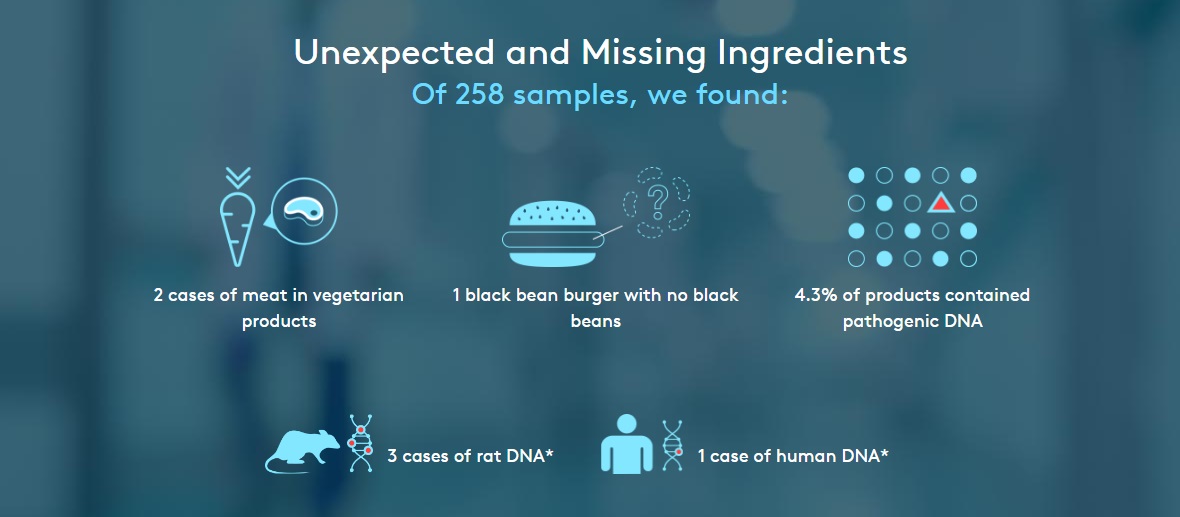
Some beef products – even those labeled as 100% beef – have been found to contain substituted ingredients or even contaminants from rats or humans, according to a new study.
“While unpleasant, the presence of human DNA or rat DNA is not likely to be harmful for human health,” the study notes.
While more and more consumers are becoming conscious of their food choices and the impact their diet has on their bodies and the world around them, many are unaware of the common practices and safety regulations of the factories that manufacture or package some of our favorite foods.
The study, which was conducted by the US-based food testing company Clear Labs, tested samples from 258 burgers – including ground beef, frozen patties, fast-food and veggie burgers. The study discovered two cases of meat in vegetarian products, three cases of rat DNA and one case of human DNA.
Although we would like to think that our food has had a rather uneventful journey, never coming into contact with bacteria, animals or human DNA, the reality of the industry is quite the opposite.
“The most likely cause is hair, skin, or fingernail that was accidentally mixed in during the manufacturing process,” Clear Labs said, referring to the human DNA finding. “What many consumers don’t know is that some amounts of human and rat DNA may fall within an acceptable regulatory range.”
As it simply cannot be avoided – and is not harmful to humans – contamination is expected by food regulatory authorities.“It is economically impractical to grow, harvest, or process raw products that are totally free of non-hazardous, naturally occurring, unavoidable defects.”-FDA Defects Level Handbook
As a result, Clear Labs had expected to find very low levels of contaminants in the products tested for the study.
“The low incidence of hygienic issues surfaced by our study is a testament to the burger industry as a whole and the stringent protocols for safe food handling. As noted by the FDA, certain low levels of contamination are acceptable,” Clear Labs said.
The study, which was created to provide a comprehensive overview of the burger industry, also found that many of the tested products had ingredients substitutes, and in some cases, missing completely.
Of the 258 burgers tested – taken from 79 brands and 22 retailer – the vegetarian products revealed the most alarming results. According to the report, 23.6% of vegetarian products showed some form of discrepancy between product and label, compared to the 13.6% of all samples.
In fact, advertised ingredients were missing from as many as 15% of the products tested – one black bean burger was found to contain no trace of black beans. In addition, some of the meat products were also found to have substituted ingredients. A total of 16 meat products – or 16.6 percent of all samples – including beef, chicken and pork, were found to have similar substitutions.
As expected, the study also discovered that many of the product’s nutritional content was inaccurate, with nearly half of the products containing more than what was advertised on their nutrition facts label – around 40 additional calories per serving on average. This can prove to be problematic for consumers wishing to know accurate nutritional values and ingredients – whether it be for allergies or religious reasons – for the products.
“Considering that FDA labeling requirements make it mandatory for most fast food restaurants to publish nutritional information on fast food menus, these discrepancies are potentially worrisome for customers who make decisions about what to order based on calorie counts and other available nutritional information,” Clear Labs said.
To read the full study, click here.
Image: Flickr, Brad Greenlee
You want to support Anonymous Independent & Investigative News? Please, follow us on Twitter: Follow @AnonymousNewsHQ
This Article (Burger Industry Study: Hamburgers Found To Contain Human DNA while Vegetarian Products Contain Traces Of Meat) is free and open source. You have permission to republish this article under a Creative Commons license with attribution to the author and AnonHQ.com.






